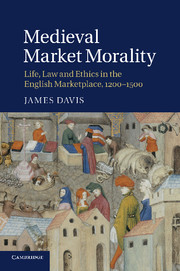Introduction
Published online by Cambridge University Press: 05 December 2011
Summary
The fifteenth-century poem London Lickpenny provides a vivid portrait of a town's streets, brimming with the vibrant noises and sights of market life. Within the marketplaces of medieval London swarmed a multitude of hawkers, pedlars, cooks and stallholders, all crying their wares and pestering potential customers:
Then went I forth by London stone,
Throughout all Canwyle streete;Candlewick Street
Drapers mutch cloth me offred anone.
Then comes me one, cryed, ‘Hot shepes feete!’
One cryde, ‘Makerell!’; ‘Ryshes grene!’ another gan greeteRushes
One bad me by a hood to cover my head –
But for want of mony I myght not be sped.
The poem portrays a young man from the country who is bewildered by the cacophony of sounds, but is perhaps also seduced by the contrasting sights and smells of a commercial world in which money is the prime motivational force. The writer emphasises the variety of goods on sale, as well as the belligerent persistence of the vendors. However, a distasteful undercurrent is implied. A hood lost by the young man is later spotted by him on a stall, being sold amidst other stolen goods.
A similar touting for wares is seen in the Prologue of William Langland's Piers Plowman (c.1360–87) in the ‘Fair Field Full of Folke’, in which cries of ‘hote pyes, hote!, Good goos and grys’ ring out. Bakers, brewers, butchers, cooks, taverners, weavers, tailors and other craftsmen are all represented in this ‘Fair Field’. Yet, Langland's commercial world, though brimming with opportunities and variety, belied another more insidious, deceitful and harmful environment, where people and traders competed with each other for material goods, driven by their own venality, avarice and gluttony. An early fourteenth-century preacher's handbook, Fasciculus Morum, described this dualism: ‘A marketplace or a fair is now filled with people, stocked with all sorts of goods, joyful and magnificent, and in a little while everyone goes back to his home, one with profit, another with loss, and the place at once becomes deserted, ugly, dirty, and contemptible’. A thirteenth-century French Dominican, Humbert de Romans, similarly lamented the quarrels, drinking, fraud, perfidy and injustice that pervaded medieval marketplaces. He related the tale of a man who entered an abbey and found many demons in the cloister, but in the marketplace there was only one, alone on a high pillar. He was told that the abbey and cloister were arranged to help souls find God, so that many devils were needed to lead the monks astray. But in the marketplace, since each man was a devil to himself, just one other demon sufficed.
- Type
- Chapter
- Information
- Medieval Market MoralityLife, Law and Ethics in the English Marketplace, 1200–1500, pp. 1 - 33Publisher: Cambridge University PressPrint publication year: 2011

